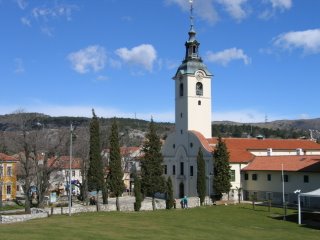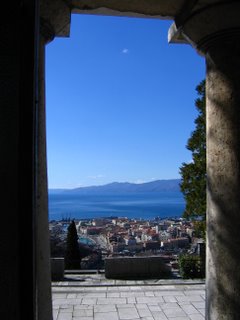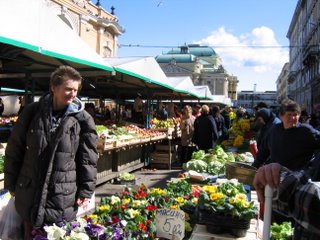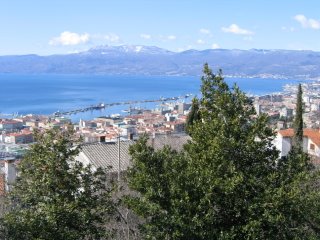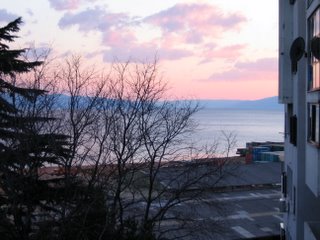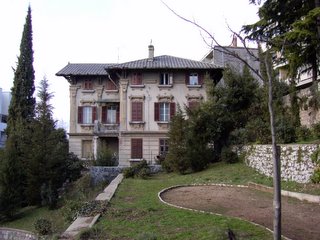28 February, 2006 ~ Rijeka, Croatia5:55 pm (17:55) local time
I left Atlanta at 6:20 pm on NW/KLM, approximately on time, except for the long line of planes we had to wait in on the runway. We landed in Amsterdam (my transfer point) on time too, but then had to wait for our terminal to open up. It was snowy there, and they were apparently backed up in de-icing planes. We waited on the runway about a half hour before pulling up to our gate and deplaning. I had plenty of layover time (2 hours), unlike many other people on our flight, who were very agitated about the delay. The eight hour flight was pretty comfortable since I had both the seats next to the window to myself and could stretch out a little. Still, I only slept about an hour, partly because I watched the in-flight film (Pride and Prejudice) and partly because I was keyed up. I was very tired during my 1½ hour layover at the Amsterdam airport, which seemed smoky to me. But I found a non-smoking area to wait in until they allowed us into the gate for our flight.
The flight to Zagreb was on Croatian Airlines and I thought most of the passengers were probably Croatian. There were some guys (a group of three) sitting next to me who reeked of alcohol and cigarettes, so I imagined they were in Amsterdam to party. One was dressed in tight black (polyester?) pants and a black turtleneck and reminded of the “wild and crazy guys” from SNL. At the airport in Zagreb my luggage didn’t arrive on the belt in the first batch. Pretty much everyone else had collected theirs and gone, so I spoke to the other people there to ask if they were missing pieces, and they turned out to be an American legal team here working on war crime trials. They said I would really like Croatia and especially Rijeka, since it’s Mediterranean. My luggage (both very heavy 50 pound pieces – partly full of books and gifts for people here), did then show up on the belt. I went through customs very quickly and found the embassy driver waiting for me just outside the customs gates (with a sign with my name on it). What a welcome sight he was. He (Goran) had a big Ford SUV parked right at the entrance/exit, so it was a very smooth arrival and easy trip to Rijeka.
Goran drove me straight to my apartment here in Rijeka, though we did take one turn around this side of town to find the right street and house. The countryside on the way here was all snowy and mountainous, and there was not much traffic. Goran said this was partly because the highway we were on is new and nice and you must pay a toll to drive it, so many Croatians take back roads. There were these forms along the road, like signs, but cut out in the shape of bears, so I asked Goran if that meant there were bears around, and he said that there are, though they are smaller than American bears, and not fierce.
My landlady, who is 87 and doesn’t speak English, had her nephew (Vinko) and his son (Matko) here to greet me. In fact, she has been in the hospital for a few weeks, and I still have not met her, though Vinko is very nice and helpful. Goran and Matko carried in all that nightmarishly heavy luggage (plus three heavy boxes of books I had shipped through diplomatic pouch straight to the embassy), for which I was very thankful. I was, by that time, going on about 22 hours with only a few brief snatches of sleep, so I was exhausted and overwhelmed. But I saw right away how nice the apartment is.
Vinko and Matko, who both speak English (Matko especially well) showed me how everything in the apartment works, and generally answered my questions and told me about the neighborhood. We arranged to meet the next morning at 10 am to meet with the international relations office and get the paperwork started for my residency permit. We also went up to the neighbors – Beba and her son Christian – and they let me use their computer to look for a phone number we needed. Everyone seems very nice. And the place is pretty. I have views of the sea from my very tall windows and lovely balcony.
I am utterly exhausted and hope I can sleep the night through to be ready at 10 am tomorrow (which will be 4 am back home – at the time my internal alarm is adjusted to). I tend to feel jet lag pretty deeply and have trouble adjusting to new time zones. But I find that if I avoid caffeine, drink a lot of water, and just try to make myself stay up until approximately the time to sleep in the new place, it works fairly well. I am just going to eat a sandwich that I brought all this way and then make up the bed to go to sleep.
2 March, 2006 ~ Rijeka, Hotel Continental
It's Thursday at 10:30 am here in Rijeka, Croatia (where I arrived two days ago) – so everyone back home is probably sound asleep (since it’s 4:30 am there). I am adjusting pretty well to the different time zone. I slept almost 8 hours during the actual night here the last two nights (often a challenge for me with jet lag), thought not continuously. Yesterday I spent the whole day with my landlord, going to meet the international relations people, going to the police to register (a requirement for all foreigners with 24 hours of entering the country), and going on errands. The landlord (Vinko) took me in his car to a very large supermarket on the outskirts called Plodine. But I did not buy as much as I would have or look around as I wanted to because he was waiting in the cafe for me, and he had already spent the whole day on my business. Still, I got 4 big sacks full of food and staples, plenty to last a week or more.
My apartment is very nice - tall ceilings and windows give it an even more spacious and elegant feel than I expected (I had seen pictures before I left). It has views of the Adriatic Sea from most windows and the balcony. There are beautiful wooden floors in a kind of herringbone pattern, along with some antique furniture and some new furniture. The kitchen and bath are new, and all seems comfortable so far, although it’s a bit cold now. But I have a down comforter on the bed, so it has been fine to sleep. I’m sure most of the time I’ll be here it will be quite warm. I've been assured by several people that the weather will turn nice very soon and that winter is almost over.
Most stuff is brand new in the apartment. I am the first person to get to use this apartment since my landlady got control of it. Vinko and Matko told me the story last night that she originally had the whole building (it came to her through her family of which she was the only child). But when communism took over the country the party took control of the building and said it was too big for one family, so they broke it into apartments. Then just recently she petitioned to at least get this one apartment back. Apparently some other family had been squatting there for years and so it was in terrible condition. I think Vinko – the landlady's great nephew and her only family – did most of the renovation himself. He is an engineer and seems quite meticulous, so it's very nice and really brand new. Even the sheets and towels have never been used. And the stove and oven are brand new (and so smelled the first few times I used them). There is a dishwasher too and a washing machine in the bathroom (dryers aren’t used much in Europe – but I have a drying rack and will have a line on the balcony). Vinko doesn't even know how to use all of the stuff, so he's been giving me pamphlets and instructions to figure it out. And he’s very accommodating about asking me what else I might need and then providing it. There are other neighbors in the building (maybe five apartments in all) who seem very nice and keen to meet me.
I have not met the people in my department yet. I called my mentor yesterday, but got no answer. I think I left a message, but the instructions were in Croatian, so I'm not totally sure.
It's rainy today. I was going to try to find the department and walk around town, but so far I have only made it to this hotel, which has an internet cafe. It's very smoky here - everywhere. I tried to find a terminal by itself but someone just sat next to me and lit up. Everywhere I've been the smoke has been oppressively thick and annoying (to me). On a more positive note, food-wise there's a strong Italian influence, so lots of pasta, pizza, and good cheese in the stores.
2 March, 2006 ~ 15:55 pm ~ Rijeka, English Department Office
In response to questions from a friend about some of my earlier reports: Q: “You have to register with the police? Wow!” A: The good thing about registering with the cops once here is that you do it instead of getting a visa. So it did save me a lot of bureaucratic hassle. While we waited in line at the police station Vinko told me that the other people ahead of us (who were arguing vigorously with the woman at the counter) were Macedonians trying to immigrate. They seemed to just keep arguing the same thing over and over. There was also someone ahead of us later from Kosovo arguing a bit with the same woman (we had gone to fill out forms in between). Who knew Croatia would be a hot spot of people trying to immigrate? My case (for registering) went very smoothly by comparison. Overall the police building was jam packed with people for various business. The longest line was apparently to do with drivers licenses.
Q: “When did the communists take over that building and break it into apartments?” A: The building I live in was taken over and broken into apartments shortly after WWII. And my office mate/colleague whom I just asked that question of told me that it wasn't ever really communism here. It was socialism. So it was the socialists who seized it. She said if they’d really had communism it would have been a paradise, but since they didn’t ever have anything like a paradise, it was never really communism, but a mixture of communism and capitalism, i.e. socialism.
I’m going to check into wireless possibilities for internet access. So far I haven't even taken out my laptop. There seems to be more use of dialup from what little I've seen. Later: wireless is not available where I live. I ended up with the only dial-up service they allow for foreigners, about $1.20 per hour during peak times (half that at non-peak times). I'm still pretty out of it all around. It's an accomplishment for me to sleep during the night and eat at the right times (which is not when my body wants to do those things). And I feel good about having walked to town and back twice today – it takes 15-20 minutes each way.
I have now met a few colleagues and seen the dept. It's crowded and different from what I’m used to, but sufficient. In fact this office is much like those I used as a grad student. It should be fine – seems like most Croatians don't stay in their offices much anyway. I'm the only one here now. I met one of my colleagues yesterday and she was nice. Her name is Branka. There are ashtrays on the tables (five desks). Everywhere here reeks of smoke. It reminds me of when I was a kid (not in a good way) when all my relatives smoked.
3 March, 2006, Friday ~ English Department Faculty Office ~ 14:49 (2:49 pm)
Things here are fine, though cold. It actually snowed the last few mornings, but it did not stick. By mid-morning both days it turned to rain. And the rain has been non-stop. It's a soggy, cold walk into town, where I am now in the office I share using the computer. Practically the last thing I put into one of my suitcases was an umbrella, and I'm very glad for it now. On the walk home one evening in this cold rain, when I was very tired and trying to find the underground passage I need to take to get to my street (a kind of short-cut), I stepped into a hole in the sidewalk that was of course full of water. My foot twisted, so my shoe and sock were soaked. Ah, the joys of being an almost clueless foreigner stumbling about in a new town.
It's been a little hard figuring things out because I don't speak Croatian and I don't live with other foreigners who typically can help explain how things work for those of us who don’t yet understand or feel familiar with most aspects of the culture. I am going to try to learn at least a little Croatian. Darko, the head of international relations for the university who found my housing, offered to exchange Croatian lessons for English lessons (though his English is very good and my Croatian is non-existent). And I have to say virtually every single person I've asked for information has spoken at least a little English, and often quite good English, much more so than in Hungary, for instance. So that has made it all much easier
I had kind of a hard night sleeping last night because first it was really cold (my apt has very large rooms and tall ceilings, so heating it is a challenge), then I woke up from weird dreams, and then I couldn't get back to sleep for a while because there is construction or something going on at the port right across the busy road (also a lot of traffic noise). I can't believe the construction or work goes on all through the night, but it does. I would hear the "beep, beep, beep" of a truck backing up, then a load being dumped (loudly), and then scraping and banging noises. The port is literally right across the street, though I'm at the end of it, so I still have something of a view, especially since we're on a hill (above the port). There's a little beach just at the end of the little park below our building. Because of the rain, I have not explored nor investigated so much. By the way, I woke up at about 3:30 am, and I figure our Thursday yoga group was probably at a restaurant right about that time, which made me a little homesick. But once the lull (clank, grind, bang) of the bulldozers kicked in, I finally fell back to sleep.
An interesting genealogical note: I asked my landlord Vinko about my Croatian Grandmother's surname, Kosmuch. He said it's definitely Croatian, probably from right around here. That was nice to hear, so maybe I'll find some long lost relatives. Vinko actually helped me draw up a little genealogical chart of our family, which I guess is one of his interests. His son Matko (a theology student at this university) was going to help me find some stuff in town today and sign up for Internet, but the weather is so bad (rainy and cold) that Matko called to postpone for some other day.
I think I'll start work Monday or one day next week. Everything seems really laid back in that regard. My mentor (dept. head) is not even around right now because of some health problems. So work is a bit confusing since no one else knows what I shall teach or when, etc. But everyone I’ve met has been kind, helpful, and seems friendly and interesting. So I’m not worrying.
The town seems pretty and interesting. Of course it's on the sea, and is a big industrial port city, so it’s not entirely pretty. But it has it charm. There's a river that runs right through town, and a canal, with lots of seagulls (and the ubiquitous pigeons). The river and canal are crystal clear, and I don't know if that means they're clean or so polluted that nothing lives there. And the town is very hilly; in fact there are mountains everywhere I've seen in the country so far, all the way from Zagreb straight to the sea (here). Up on one big hill in town are the old castle (Trsat) and a church. I haven't gone up there yet. I think there's something like 600 steps to get there. And in the rain (non-stop the last two days) and cold, I haven't wanted to tour much yet. I have walked up and down the Korzo – the main street downtown that is a pedestrian shopping street. There's a McDonald's on the Korzo, which I will never visit. But Goran, the embassy driver (who drove me here) said that he's been to the States, and McDonald's here tastes much better than McDonald's in the States. There are also lots of pizzerias and seafood restaurants. I haven't really found many bakeries yet, but then I haven't had much chance to explore (so that is to say I haven't stumbled on a bakery – though there was a shop selling pastries right on the street I walk to and from to get to town, and the woman there persuaded me to try a few, which were so-so). There seem to be a couple of shopping malls on the Korzo, and a bookstore, lots of clothes and shoe stores, and other shops, also many cafes and restaurants.
There is a tower in town (just near this office, which is near the center) that leans a bit, "just like the tower in Pisa," Vinko told me when we passed it on the way to the police station. It does lean and looks architecturally similar to the leaning tower of Pisa (which I climbed years ago), but this tower leans only a little, not nearly as much as that one in Pisa. And there are many churches in town, including one orthodox one (or at least one that I've seen). I haven't gone in any such places yet, because as I said, I've been kind of focused on getting settled and getting business taken care of rather than touring. I did go into the city hall on the Korzo one day to ask directions. It seems pretty modern.
I've eaten all my meals at home, and they've been simple and utilitarian so far because I haven't had energy for more. I did have one meal out with Vinko – pizza in a very typical Italian style (that first day here amidst our errands). It was a nice little pizza café that was maybe part of a hotel – both right on the sea just south of town. I was happy to see some more of the sea, away from town. Vinko pointed out the islands, Krk and others.
Today when I leave here I may go look for a big health food store I heard of. I found a little one yesterday, but apparently there is a much bigger, better one not far from my house.

